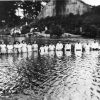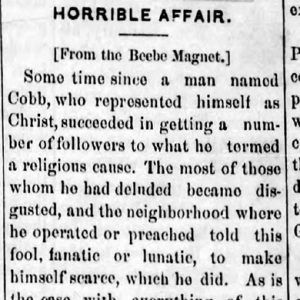calsfoundation@cals.org
Cobbites
The Cobbites were a religious group that began in White County in 1876 under the leadership of the Reverend Cobb. Their strange behavior eventually culminated in the gruesome murder of a local citizen and several Cobbites. The group did not last past 1876.
Cobb called himself “the walking preacher.” Little is known about him, not even his full name, other than that he came from Tennessee to White County in 1876. To his followers, he claimed to be God or Jesus Christ. He apparently believed he could perform the works of God, and he used a sycamore pole to command the sun to rise each morning and did the same each evening to command it to set.
His followers were just as fanatical and strange. A common practice among the Cobbites was walking back and forth on the housetop with their eyes shut. They seemed convinced that this proved they were protected and commissioned by God. They believed that the only way to become like Christ was to be sanctified. Sanctification could only come through Cobb to the women, and then through the women to the rest of the group; his idea was based upon 1 Corinthians 7:14, in which Paul writes, “The unbelieving husband is sanctified by the wife.” They believed that a person who was sanctified could not sin and could not be harmed. It is unclear exactly what the Cobbites believed beyond sanctification and divine protection.
The Cobbites did not become a large group, consisting mainly of two local families, the Dovers and the Nelsons, led by Cobb. The group settled in a two-story log house a few miles south of Searcy (White County). It was owned by a Preacher Dover (full name unknown). They destroyed all the furniture in the house, killed all the cats and dogs, and tore down the fences to let the cattle roam free. A few of the Cobbites would stand near the road, drag passersby from their buggies and horses, and make them pray inside the house. Local citizens became alarmed by the bizarre behavior of the Cobbites. Others who heard the strange tales traveled to the settlement to satisfy their curiosity.
One such curious citizen, a Searcy bartender named Carter Humphries, along with his friend Rufus Blake, traveled out to the Cobbite settlement to see what all the fuss was about. When the Cobbites saw the men, they came toward them, telling Humphries and Blake that “God is here” and “come in and see God.” Humphries made a sarcastic remark, and the Cobbites dragged the men from their wagon with shouts of “Kill them!” and “Cut their heads off!” A dull ax was brought out, and Humphries’s neck was stretched over a nearby tree root. His body was held still, and Dover proceeded to chop off Humphries’s head. When Blake saw what was in store for him, he escaped from the Cobbites and rushed back to town.
An armed mob was formed, and they rushed to the Cobbite settlement. The Cobbites claimed that the mob’s guns would not go off, but after an initial misfire, several did, and Dover and his son-in-law were killed. The rest of the Cobbites were arrested; several later became ill and died in prison. Reverend Cobb disappeared soon after, and the rest of the Cobbites dispersed.
For additional information:
Leach, W. J. “The Cobbite Story.” White County Heritage 4 (1965): 2–5.
Presley, Mrs. Leister E. “More Activities of Reverend Cobb.” White County Heritage 5 (1966): 14–16.
Taylor, Heber. “Jones Cult Stirs Memory of Cobbites.” Arkansas Gazette. December 28, 1978, p. 1B.
Shelby Watkins
Little Rock, Arkansas







I am the great-great-great-grandson of Colonel Robert W. Chrisp, judge of White County, Arkansas. I still have his judgeship papers and stories of his Confederacy campaign as well as his title of the death. From lore and print: the beheaded was a close friend of my grandfather and was there to resolve the issue of the Cobbites. Robert would walk through hell on Sunday to make things right. I fear the Cobbites were introduced to his wrath.
Hi Deanna! My grandmother is a Jones and the youngest of thirteen. We learned this story on her deathbed because my grandmother asked her siblings to not tell us. Thank you for the info. It is a sad story in our family history but it’s nice to know even if it’s not pretty.
I am a direct descendant of Rev. Dover; he was my great-great-grandfather.
Dover’s first name was Lemuel. I believe his wife’s name was Clementine (she as arrested and died in jail). His son’s names were James, John, and Lee. Cobb’s first name was John.
The only other info I have is that the surviving members of the Dover family relocated to Oklahoma. As you can imagine, this story isn’t one our family is proud of, and not much has been passed down.